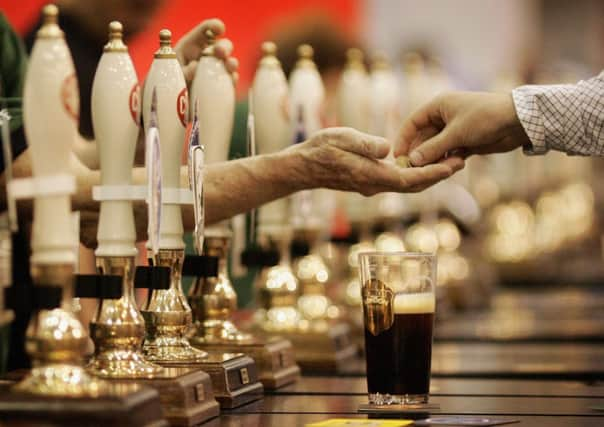I’m calling time on cheap beer myths


IT WOULD seem that beer duty cuts are now the modern-day equivalent of buses – you wait 53 years for one and then two come along on consecutive years.
The further reduction of beer duty by another penny in this year’s Budget might not sound like much, but think about this – had the hated Beer Duty Escalator remained in place, we would be paying at least another 20p on the price of a pint than we are today.
Advertisement
Hide AdAdvertisement
Hide AdOf course, the anti-alcohol lobby’s entirely expected knee-jerk reaction would have you believe that the Chancellor George Osborne was misguided in the extreme and that he did nothing to curb what it perceives as the United Kingdom’s unhealthy relationship with alcohol.
This simply couldn’t be further from the truth. When duty goes up, the vast majority of publicans have no option but to pass on the increase to their customers, while the large supermarket chains claim to absorb the duty increase when in actual fact they are cross-subsidising – doesn’t it seem a wee bit immoral to you that cheap booze is what they use to drive footfall in their stores, rather than the cheap bread and milk of 20 to 30 years ago?
Well-run community pubs are a part of the solution when it comes to problem drinking, and by helping our beleaguered pub industry the Chancellor was actually striking a blow against cheap supermarket hooch.
Dr Nick Sheron, a liver specialist at Southampton General Hospital, a former adviser to at least one of the Westminster health committees, and founder member of the Alcohol Health Alliance UK, states that the majority of people who present themselves to his unit with alcohol-related liver disease do their drinking at home, alone.
There are a number of studies that show moderate alcohol consumption is actually good for us, particularly our hearts, and that drinking a couple of pints of real ale a day does you no harm – especially if you walk to and from the pub – and drinking those couple of pints a day in company is good for your mental health.
Drinking in well-run pubs, far and away the most controlled environment to do so, engenders an environment that makes sure people don’t drink too much, with landlords under legal obligation to refuse to serve someone who, in their opinion, has had enough.
This simply is not the case if you are drinking alone in the house or on a park bench, when cheap, low-quality, high-strength booze can be purchased and drunk at will.
Visitors to this country list a visit to a pub as one of the top ten reasons they come to the United Kingdom. We should be protecting and promoting one of our biggest international assets, not pushing more and more of them towards closure.
Advertisement
Hide AdAdvertisement
Hide AdPlus, let’s not forget that pubs employ a disproportionate number of people under the age of 30, be they students or young people just starting out in the big world of work – and with hundreds of thousands of young people on the dole, that has to be a good thing.
Pubs also raise hundreds of millions of pounds for charity every year and are centres for many sports teams, be they football, pool or darts, and the beating heart of many communities where traditional values, like looking out for your neighbour, still exist.
Despite the British pub still being seen as an integral and important part of our identity it has become an industry that needs all the help it can get after suffering through years of the beer duty escalator, greed and mismanagement from the large pub-owning companies, and the inability or unwillingness of planning authorities to protect historic pubs in the same way they would other historic buildings.
Anyone criticising the Chancellor for this cut in beer duty needs to understand the bigger picture and realise that this isn’t about cheaper beer – it is about the price of beer in pubs not going up as quickly, and it’s about protecting an industry in crisis that, in the majority of cases, has done absolutely nothing to deserve it.
• Colin Valentine is national chairman, Camra (Campaign for Real Ale) www.camra.org.uk
SEE ALSO